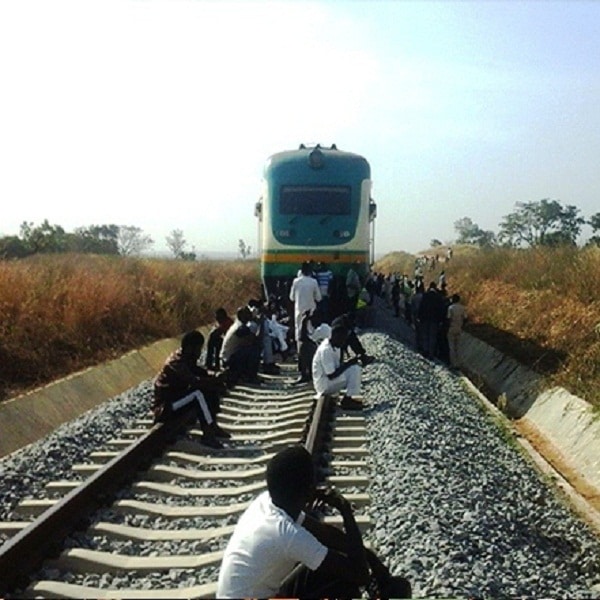Examining the implications of the frequent breakdown of the Nigeria Railway Corporation (NRC) locomotives along the Abuja-Kaduna corridor and the need to address the problem once and for all
With the surge in passenger traffic and increase in revenue generation on the Abuja-Kaduna axis of the modernised rail transport system, the frequent breakdown of locomotives on the axis has been described as an embarrassment to the nation by the elites who urged the government to as a matter of urgency and priority tackle the lingering problem headlong.
It is disheartening that barely six years after the inauguration of the Abuja-Kaduna rail lines constructed with huge loans facilities amounting to $500 million from the Chinese government, the Nigeria Railway Corporation cannot handle mere issues of locomotives’ maintenance thereby having to resort to avoidable apologies as passengers’ lives are being put at risk anytime there is a breakdown.
While it is no longer news that the growing insecurity in the land is putting pressure on rail transportation, there is an urgent need for the federal government to ensure passengers get to their destinations in record time without being exposed to any danger.
For the umpteenth time, hundreds of passengers on the Abuja-Kaduna train service were a few weeks ago stranded in the bush after the train developed a fault a few minutes after it left Rigasa Station in Kaduna State.
A passenger had taken to social media in a tweet to announce that the train had initially stopped twice before it finally broke down in the middle of a forest in Dutse, Kaduna.
It was gathered that the train had broken down severally in the past, leaving passengers stranded, disrupting their travel plans, and also exposing them to undue security risks.
Of recent, the NRC has been in the bad news for simple issues of maintenance. While the frequent breakdown of locomotives cannot be blamed solely on the corporation, the government should devise means of ensuring the situation is arrested. But, the recent pronouncement by the Minister of Transportation, Mr. Chibuike Rotimi Amaechi, who has acknowledged that the frequent breakdowns of locomotives on the Abuja– Kaduna corridor is a result of lack of spare parts for the trains is worrisome.
According to the minister who was on an inspection of the newly inaugurated Lagos-Ibadan rail, barely a month after revealed that the breakdown of the Abuja-Kaduna train is due to lack of maintenance which is attributable to a lack of spare parts.
Amaechi has said that his ministry has written to Mr. President on this issue and that the president has graciously approved the purchase of spare parts for the Lagos-Ibadan trains which, according to him, “Very soon, enough spare parts for the Lagos-Ibadan rail will arrive the country. By the time this occurs, we will use some of these parts for the Abuja-Kaduna, and hopefully, the issue of incessant breakdown of the trains will be resolved.”
But, the question on the lips of Nigerians is how soon will the spare parts arrive in the country? He has explained that trains that are currently failing were bought in 2016 and had worked perfectly until now that some parts needed to be changed and others serviced. While this is commendable, the Nigeria government should look inward to see if these spare parts can be manufactured right here in the country because on November 10, 2019, Vice President Yemi Osinbajo, in Kajola, Ogun State, kicked off the construction of the first-ever wagon assembly plant for the railway system in the country, saying it is part of efforts to localise rail technology in Nigeria.
Osinbajo said while performing the ground-breaking ceremony that the rail system of transportation held the key to the transformation of commerce in Nigeria and across the continent, as it would link the ports and provide an integrated transportation network.
He had noted that the project, when completed, apart from generating about 5,000 jobs, was expected to produce some parts of the wagons for the Lagos-Ibadan and Abuja-Kaduna rail lines, stating that it is also projected to produce some parts for the central rail lines that would link other rail operators within the West African sub-region.
Osinbajo observed that by building the rolling stock locally, import and export businesses within, into, and out of Africa’s largest market would receive a heavy boost. He cited that the plant in Nigeria and the commitment to hiring Nigerians and Nigerian businesses affirmed President Muhammadu Buhari’s directives in Executive Order 5 and that the executive order focuses on prioritising Nigerians and Nigerian businesses in the innovation, production, and procurement of engineering projects and services.
The vice president stated, “The plant would offer an important platform for engineers, technicians, artisans, and other professionals to gain the specialised skills required for the production and maintenance of rolling stock.”
But, almost two years after the inauguration, THISDAY checks revealed that there is nothing concrete on the ground as the project only has a skeletal iron rod standing and nothing more to show.
Also, Amaechi had explained that to meet the increasing demand of both passengers and freight on the new Nigeria Standard Gauge Railway Service, the federal government had awarded the contract for the procurement of rolling stock. This, he said, included locomotives, coaches, wagons, and contemporary Diesel Multiple Units to serve the movement of passengers and freight on the Abuja-Kaduna, Itakpe-Ajaokuta-Warri train services as well as the on-going Lagos-Ibadan railway. It will also serve any railway service in the West-African sub-region.
He had stated that it was in the pursuit of these objectives that the Federal Ministry of Transportation signed an agreement with Messrs CCECC Nigeria Limited in March 2018 to establish the plant for the production and assemblage of rolling stock, spare parts, and maintenance equipment in Nigeria.
“Messrs CCECC conducted a feasibility study in which the choice of Kajola was arrived at as the suitable location for the project, the minister stated.”
He said the project was a direct investment of Messrs CCECC Nigeria Limited in the country and part of the gains from the contract signed for the supply of the rolling stock.
“This will be the first of its kind in Nigeria and the first batch of the wagons to be assembled from the production line of this plant will form part of the rolling stock for Lagos-Ibadan and Abuja-Kaduna railway operations. Subsequently, other rolling stock would be produced as its production capacities increase,” Amaechi said.
It is beginning to dawn on the government that the agreement entered into by Messrs CCEC two years after hasn’t seen the light of day as NRC continues to record casualties in numbers of breakdown locomotives.
The minister regretted that the breakdown of operations along the Kaduna-Abuja corridor was due to the late arrival of spare parts from China. Experts observed that this could have been averted if the Kajola project was given the right priority it deserves. While it is noteworthy to state that the Chinese government is to build, manage and maintain the plant for years as agreed before handing it over to the federal government is not enough to keep silent and continue to wait for the endless arrival of spare parts from overseas.
“It is worrisome that these locomotives that are brand new are failing. The locomotives have a warranty that covers them for over four years and the government is considering returning them to China.”
However, passengers have continued to lament the rigours of travelling on the route by train and encountering incessant breakdowns, which leave them stranded for hours. Regular travellers have expressed worries that the rail route, which has been a safer alternative to the bandits-infested Kaduna-Abuja expressway, is also beginning to feel insecure.
According to Amaechi, “After the last breakdown of the Kaduna-Abuja train, I instructed the Nigerian Railway Corporation (NRC) to rest that particular locomotive. I am surprised that there was a delay related to another breakdown.
It should be on record that Nigerians are beginning to embrace rail transportation as a means of movement and the government cannot afford to fold its hands on whatever problem the system is encountering. Lagos-Ibadan axis alone conveyed 42,000 passengers in June and the Minister is already calling for scale-up. Amaechi, while speaking in Lagos recently, said: “We came back because by the time we commissioned the project, there were minor things that they needed to complete and we needed to see that they had been completed. He noted that apart from Olodo station, most of the stations are completed and they will focus on it. We came to see those things.
“Again, they’ve completed communications and signalling but we need six months to be checking regularly to make sure it is working efficiently, if not, we can’t have 18 or 16 trips a day. To have 16 trips a day, we must ensure that communications are in perfect condition.
“We just wanted to see how they have been able to conclude the things; we wanted them to conclude before scaling up the number of coaches and trains they can put on the track. I have asked NRC to scale up from four to eight trips a day”, he said. Again, why a path should be given to the Minister at the back, every single issue concerning the rail system must be given the right attention it needs before the trains breakdown.
The Managing Director, Nigerian Railway Corporation (NRC), Mr. Fidet Okhiria, has already ruled out concession plans. According to him, the federal government has no plan to concession the operations of Abuja-Kaduna Railway to private business operators.
Rather, he advised private interests to collaborate and acquire coaches and bid for licences to enable them to move passengers and goods on the same route.
Okhiria made this submission at the Infrastructure Dialogue with the theme: “Rail Infrastructure Rebirth: Catalyst for Nigeria’s Economic Potential” held in Abuja.
Source: Thisday










